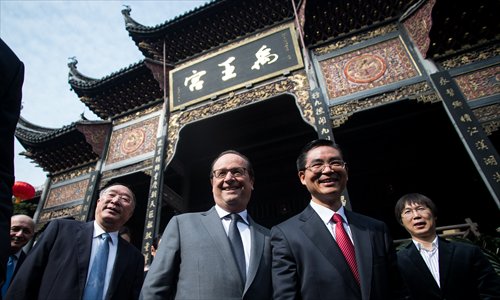China, France reach deal on climate change
Chinese support for global climate pact essential, says Hollande

French President Francois Hollande poses with Chongqing mayor Huang Qifan (left) during a Huguang Guild Hall tour in Chongqing on Monday. Hollande hopes to persuade China, a key country in the fight against global warming, to give a decisive push to negotiations ahead of a key climate conference in Paris. Photo: AFP
President Xi Jinping and his French counterpart Francois Hollande issued a joint statement on climate change in Beijing on Monday, vowing to include checks on compliance in the deals to be negotiated at the upcoming climate change conference in Paris.
Xi and Hollande called for an enhanced transparency system to build trust and confidence in the Paris pact, as well as a means to review the actions and support of various parties.
France will host the climate summit in Paris (COP21) in December, which will be attended by at least 80 world leaders, including Xi and US President Barack Obama.
COP21 seeks to unite all the world's nations in a single agreement on tackling climate change, with the goal of capping warming at 2 C over pre-Industrial Revolution levels.
Each signatory's progress should be reviewed every five years, China and France said in a joint statement, to "reinforce mutual confidence and promote efficient implementation," AFP reported.
During Hollande's two-day state visit to China starting Monday, he said that Chinese support was "essential" to reaching an effective deal at COP21, from November 30 to December 11, AFP reported.
Analysts believe that seeking more support from China prior to the climate change conference tops Hollande's agenda, since he has strived to seize the opportunity to elevate the international standing of France and the EU.
"France and the EU can no longer bear another failure in the climate change negotiations after only reaching a legally non-binding agreement at the 2009 Copenhagen Climate Change Conference," Wang Yiwei, director of the Institute of International Affairs at the Renmin University of China, told the Global Times.
"It is urgent that the EU retakes its predominant position in tackling global issues at a time when Europe has been plagued by crises over Syrian refugees, debt and Ukraine," Wang said.
Cui Hongjian, director of the Department of European Union Studies at Beijing's China Institute of International Studies, told the Global Times that Hollande has also attempted to make use of the conference to consolidate the status of France in the field of global governance, as its position has been eroded by Germany's increasing influence.
Nicolas Hulot, special envoy of the French president for the protection of the planet, and Laurence Tubiana, special representative for COP21, accompanied Hollande to China, the Nandu Daily reported on Monday.
Hollande added that "The fight against global warming is a humanitarian issue … and it is also an issue of considerable economic importance, of what we call green growth."
France also sought practical cooperation with China, one of the largest emitters of carbon dioxide in the world, in a bid to be an establisher of international criteria and technical specifications in the carbon emissions market after China and the US announced their respective post-2020 goals of coping with climate change on the basis of the US standard, Wang added.
The US has announced a target of cutting its emissions by 26 to 28 percent from its 2005 level by 2025, while the EU is eyeing a reduction of at least 40 percent by 2030 on the basis of the 1990 level, the Xinhua News Agency reported in July.
Bilateral collaboration
Besides drumming up China's support for the conference, experts said France will also strengthen economic cooperation with China in sectors like nuclear power, environmental protection, communication, food manufacturing technology and pharmaceuticals.
Hollande is accompanied by around 40 heads of French firms and a number of ministers.
On the first leg of his journey, Hollande visited a Sino-French water treatment company in Southwest China's Chongqing Municipality to highlight cooperation in green growth industries.
Cui said the two countries will also jointly explore third-party markets, such as Africa and other Asian countries.
French nuclear group Areva said Monday that the State-owned China National Nuclear Corporation (CNNC) could take a minority stake in its capital under a draft deal signed in Beijing, AFP reported.
The draft deal also foresees industrial cooperation with CNNC throughout the uranium cycle, Areva said.